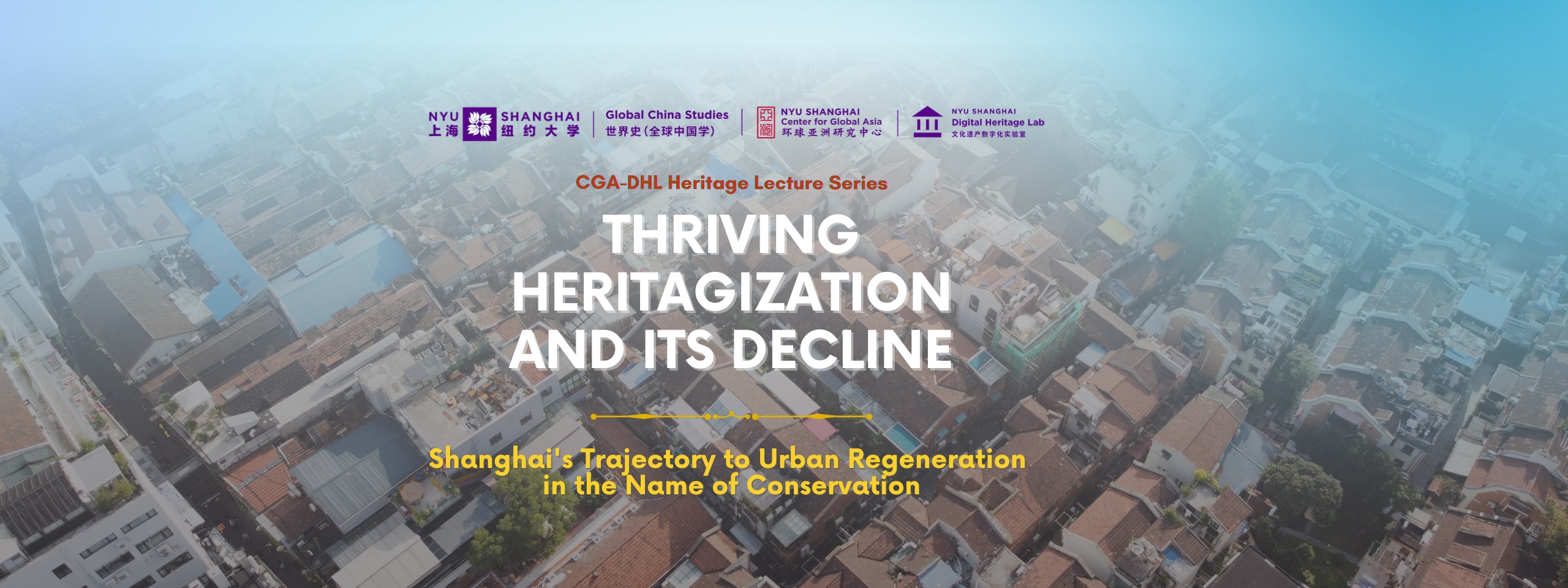CONTACT US
Email: shanghai.cga@nyu.edu
Phone Number: +86 (21) 20595043
WeChat: NYUShanghaiCGA
Address:
Room W822, 567 West Yangsi Road,
Pudong New Area, Shanghai, China

© 2024 All Rights Reserved

Speaker: Kaiyi Zhu
Venue: Room N208, NYU Shanghai
New Bund Campus
Date & Time:
2024-11-20 | 17:15-18:30
Since 1987 when a group of outstanding Chinese cultural heritage (cultural relics) were recognized and listed by UNESCO as World Heritage Properties, there has been a World Heritage craze in China to gain cultural sovereignty worldwide. Resulting from such a desire and commitment to protect its heritage, the Chinese Government at all levels have combed through the different categories of heritage designation and conservation to seek UNESCO’s endorsement. Shanghai, once marginalized in China’s heritage conservation system, has also attempted to demonstrate and categorize the values and establish an assessment system of its urban legacies built in the previous foreign concessions and affected by colonial activities, enhancing the significance of its local cultural heritage with incontestable controversial identities.
The recent dominant urban regeneration process has exposed the conflicts between investors’ demand for new development and existing conservation planning in Shanghai. Local legislative orders and regulations on the protection of cultural heritage enacted in the last twenty years seem to have lost their proper role of regulating and constraining the heritage approaches applied in regeneration projects. This phenomenon has sparked widespread concerns and discussions on “What causes the identity value of designated heritage to be challenged in the process of urban regeneration?” and “What makes the established conservation plans in Shanghai ineffective?” This talk aims to investigate the reasons for the “failure” of local conservation plans and heritage conservation regulations from the perspective of excessive “heritagization” and games between various stakeholders in recent urban regeneration. It also analyzes the practices that have led to the loss of effectiveness of the existing regulations in the light of first-hand experience and discusses possible ways to curb the spread of this phenomenon—damaging cultural heritage in the name of conservation with justified heritage approaches.
Kaiyi Zhu is affiliated with the Chair of History of Architecture & Urban Planning, Faculty of Architecture and Built Environment, TU Delft, and the UNESCO Chair Water, Ports and Historic Cities. She works at the interface of architectural and urban history, critical heritage studies, and environmental design. She is trained as an architect with an interest in protecting and transforming historic urban landscapes, identity of post-colonial heritage, and design for sustainable development goals. She also taught Architectural History and Thesis and courses related to sustainable design at TU Delft. Kaiyi is also affiliated with the Leiden-Delft-Erasmus (LDE) PortCityFutures and Centre for Global Heritage and Development programs and has become a member of the Our Collections Matter network (the representative of the Netherlands) from ICCROM since January 2023. Kaiyi was a research fellow at the China Academy of Art between 2023 and 2024, investigating bottom-up art practices in China and community engagement within.
Kaiyi obtained her PhD at the Faculty of Architecture and Built Environment, TU Delft, with a research project entitled “In the Name of Conservation”. Her research mainly focuses on architectural and urban history, transnationalism, interpretation of heritage conservation discourse and policy-making in China, as well as heritage practices in regeneration for Sustainable Development Goals. She possesses adept qualitative and quantitative research skills and has honed exceptional observational, communication, and textual analysis abilities through extensive fieldwork. She was honoured to have been selected for the IPHS (International Planning History Society) Spotlight in 2022. She also serves on the editorial teams of the journals Blue Papers and European Journal of Creative Practices in Cities and Landscapes.
Introduction by Lena Scheen, Director of the Center for Global Asia, Associate Professor of Global China Studies, NYU Shanghai; Global Network Associate Professor, Faculty of Arts and Science, NYU.
Commentator: Lala Zuo, Director of Digital Heritage Lab, Area Head of Global China Studies, Associate Professor of Art History, NYU Shanghai.
Email: shanghai.cga@nyu.edu
Phone Number: +86 (21) 20595043
WeChat: NYUShanghaiCGA
Address:
Room W822, 567 West Yangsi Road,
Pudong New Area, Shanghai, China

© 2024 All Rights Reserved